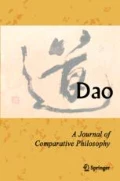Abstract
Employing the distinction between the authoritarian (based on coercion) and the authoritative (based on excellence), this study of the understanding of authority in the Analects argues against interpretations of Confucianism which cast Confucius himself as advocating authoritarianism. Passages with key notions such as shang 上 and xia 下; fu 服 and cong 從; quan 權 and wei 威, are analyzed to illuminate ideas of hierarchy, obedience, and the nature of authority itself in the text. The evidence pieced together reveals the Master to be authoritative rather than authoritarian; and the social order to which he aspired is one based on excellence rather than on coercion. The article then considers why teachings which present a model of authority as authoritative ended up as often identified with authoritarianism and concludes with some thoughts about how Confucianism might be rescued from authoritarian practice.
Similar content being viewed by others
References
Ames, Roger T. and Henry Rosemont, Jr., trans. 1998. The Analects of Confucius: A Philosophical Translation. New York: Ballantine.
Bell, Daniel A. 2006. Beyond Liberal Democracy: Political Thinking for an East Asian Context. Princeton: Princeton University Press.
Carter, April. 1979. Authority and Democracy. London: Routledge & Kegan Paul.
Couplet, Philippe et al. 1687. Confucius Sinarum Philosophus. Paris.
Eno, Robert. 1990. The Confucian Creation of Heaven. Albany: State University of New York Press.
He, Xinquan 何信全. 1996. Confucianism and Modern Democracy 儒家與現代民主. Taipei 臺北: Academia Sinica 中央研究院.
Jensen, Lionel M. 1997. Manufacturing Confucianism. Durham, NC: Duke University Press.
Knoblock, John, trans. 1988–1994. Xunzi: A Translation and Study of the Complete Works. 3 vols. Stanford, CA: Stanford University Press.
Lau, D.C., trans. 1979. Confucius: The Analects. Harmondsworth: Penguin.
Li, Minghui 李明輝. 2005. Political Thought through Confucian Perspective 儒家視野下的政治思想. Taipei 臺北: National Taiwan University Press 國立臺灣大學出版中心.
Li, Chenyang. 1999. The Tao Encounters the West. Albany: State University of New York Press.
———, ed. 2007. Special issue on “Democracy and Chinese Philosophy,” Journal of Chinese Philosophy 34.2: 151–319.
Machle, Edward. 1993. Nature and Heaven in the Xunzi: A Study of Tianlun. Albany: State University of New York Press.
Rosemont, Henry Jr., 2006. “Two Loci of Authority: Autonomous Individuals and Related Persons.” In Confucian Cultures of Authority, edited by Peter D. Herschock and Roger T. Ames. Albany: State University of New York Press.
Sun, Xidan 孫希旦. 1989. Book of Rites, with Collected Commentaries 禮記集解. Beijing 北京: Zhonghua Shuju 中華書局.
Tan, Yuanping 談遠平. 2004. Chinese Political Thought: Confucianism and Democratization 中國政治思想:儒家與民主化. Taipei 臺北: Yangzhi 揚智.
Tan, Sor-hoon. 2004. Confucian Democracy: A Deweyan Reconstruction. Albany: State University of New York Press.
Twohey, Michael. 1999. Authority and Welfare in China. London: Macmillan.
Author information
Authors and Affiliations
Corresponding author
Rights and permissions
About this article
Cite this article
Tan, Sh. Authoritative Master Kong (Confucius) in An Authoritarian Age. Dao 9, 137–149 (2010). https://doi.org/10.1007/s11712-010-9157-2
Published:
Issue Date:
DOI: https://doi.org/10.1007/s11712-010-9157-2




